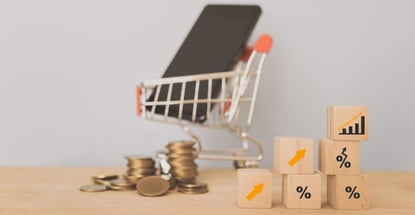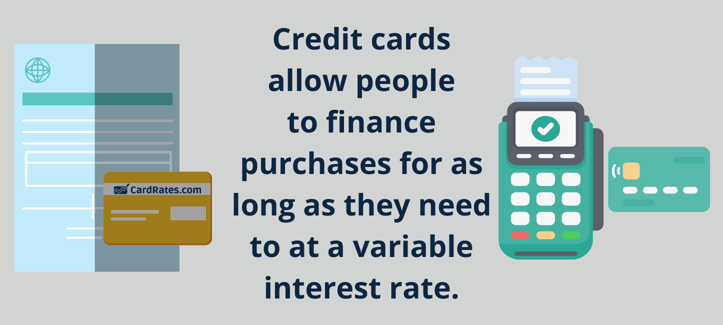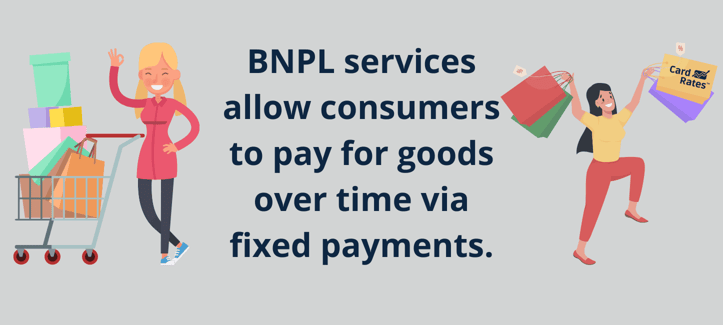
Opinions expressed here are ours alone, and are not provided, endorsed, or approved by any issuer. Our articles follow strict editorial guidelines and are updated regularly.
Payment options for consumer goods and services abound. Credit cards are most common. According to data collected by the Federal Reserve, roughly 69% of Americans had such an account in the second quarter of 2023. But buy now, pay later (BNPL) plans are also becoming popular.
A Morning Consult survey found that 1 in 5 U.S. adults said they made a purchase with one of these short-term loans in August 2023.
So should you use a credit card or a BNPL to get what you want? Here’s what each is, and their advantages and disadvantages, as well as how to decide between them.
-
Navigate This Article:
How Credit Cards Work
With a credit card, you have a line of credit that you can draw from at any time. If it’s $1,000, that’s the account’s limit. You can charge up to that amount for anything you want, from a restaurant meal to airfare to a pair of shoes. Credit cards are accepted pretty much anywhere, in physical stores and online.
All of your charges in a billing period – which is typically around 30 days — will be listed on your monthly statement. It will include the total balance, the minimum payment, and a due date. You may pay the minimum, more than the minimum, or all of what you owe.

When you pay off the entire debt by the due date, finance fees in the form of interest will not be assessed. If you make a partial payment, the remaining sum will revolve to the next month and financing fees will be added to the debt.
Interest compounds so interest will be applied to debt that has already increased with the fees. The only exception is if you have a promotional 0% APR card, which gives you a fixed number of months to charge without any interest added to the revolved balance.
Pros & Cons of Credit Cards
Among the many advantages of credit cards:
- Available in secured and unsecured versions, so people of various credit ratings may have access to an account.
- Cards with rewards programs allow you to earn cash back, points, and miles with each charge.
- The flexible payment option provides freedom.
- You will build good credit when you treat the account responsibly with on-time payments and low or no revolving debt.
- Many credit cards have sign-up bonuses of points or cash back after you charge a certain sum within a specific number of months after opening the account.
- Some credit cards have valuable perks that can make your life cheaper, easier, and more enjoyable, such as complimentary airport lounge access, embedded cellphone insurance, and credits for streaming services.
- Credit cards come with consumer protection, so if the things you charge are unsatisfactory or don’t arrive intact or at all, you can file a dispute with the credit card issuer and may not have to pay.
There are at least an equal number of potential downsides associated with credit cards too. For example:
- Interest rates can be very high, so revolved debt can become extremely expensive over time.
- When you carry a balance, you will have monthly payments to make which can negatively impact your cash flow.
- If you carry a balance and interest is added, the value of your rewards is reduced or nullified.
- The convenience of charging can make it easy to get into heavy debt.
- Some cards have annual fees, which can be an additional cost unless you get more out of the account than it provides.
- Your credit rating will be negatively impacted if you use the card irresponsibly or have financial problems that result in missed payments or consistently high debt.
- Credit cards with the most attractive benefits and features are reserved for people with excellent credit.
- Other fees, such as those for paying late, exceeding the limit, and conducting foreign transactions, can be added.
How BNPL Works
BNPL is a form of short-term financing. It allows shoppers to make purchases and pay for them over time with fixed payments, and usually with no added interest. As opposed to layaway plans, where you would get what you purchased after making all the payments, with BNPL the items are sent or provided without delay.
You will usually see the BNPL option when you shop online, with an app such as Klarna and PayPal Pay in 4. Some retailers have partnered with BNPL companies so you can shop at the physical store, then select it at checkout.

After making a down payment, which is typically a percentage of the price, you will pay the remainder over a few installments (usually four). Subsequent payments are generally expected every two weeks and are automatically deducted from your linked bank or credit card account.
There is no hard credit check with BNPL, but you do have to apply. You need to be at least 18 years of age, have a cellphone, and complete an application in which you will provide your personal identification, mailing address, contact information, and date of birth.
Pros & Cons of BNPL
First up are the benefits of BNPL:
- Get what you want without having to pay everything all at once
- Can keep you out of long-term consumer debt
- Good credit is not necessary
- Interest isn’t added to the purchase price
- The process is easy and fast
The cons of BNPL include:
- Your on-time payments will not build a good credit history
- Does not offer rewards or perks
- A late fee is assessed if there is not enough money in your account to cover a payment
- The company may alert the credit bureaus if you miss payments, which will hurt your credit report and scores
- Large payments come up quickly and can strain your regular finances
- Disputing purchases and making returns can be difficult
- You can’t use the BNPL for every purchase
How to Decide Between Credit Cards and BNPL
When deciding between credit cards and BNPL, consider the pros and cons of each.
Credit cards are almost always the preferred option if you want to earn rewards for the charges you make and know that you will pay for what you purchased before interest is added. You can come out financially ahead and enjoy all the consumer protection and perks that these products offer. The activity will enhance your credit rating when you treat the account responsibly, too.
BNPL may be the better choice when you know you can afford the upcoming payments and want to guarantee that interest will not be added. These plans can be a terrific way to get what you need without having to wait and save the money if you don’t need to create a high credit score with an account that reports payment history to the credit bureaus, or if you have bad or damaged credit. Just stick with the interest-free payment arrangement, because longer terms can have interest rates that are higher than those on credit cards.

![9 Best Credit Cards For Streaming Services ([updated_month_year]) 9 Best Credit Cards For Streaming Services ([updated_month_year])](https://www.cardrates.com/images/uploads/2022/06/Best-Credit-Cards-For-Streaming-Services.jpg?width=158&height=120&fit=crop)
![Hardship Accommodations By Credit Card Issuer in [current_year] Hardship Accommodations By Credit Card Issuer in [current_year]](https://www.cardrates.com/images/uploads/2021/08/Hardship-Accommodations-By-Credit-Card-Issuer.jpg?width=158&height=120&fit=crop)
![How to Pay Your Credit Card Bill in [current_year] How to Pay Your Credit Card Bill in [current_year]](https://www.cardrates.com/images/uploads/2021/11/How-to-Pay-Your-Credit-Card-Bill.jpg?width=158&height=120&fit=crop)
![25 Shocking Credit Card Processing Statistics ([current_year]) 25 Shocking Credit Card Processing Statistics ([current_year])](https://www.cardrates.com/images/uploads/2023/11/Credit-Card-Processing-Statistics.jpg?width=158&height=120&fit=crop)
![25 Fascinating Credit Card vs. Cash Spending Statistics ([current_year]) 25 Fascinating Credit Card vs. Cash Spending Statistics ([current_year])](https://www.cardrates.com/images/uploads/2023/11/Fascinating-Credit-Card-vs.-Cash-Spending-Statistics.jpg?width=158&height=120&fit=crop)
![Credit Scores Needed for Chase Cards in [current_year] Credit Scores Needed for Chase Cards in [current_year]](https://www.cardrates.com/images/uploads/2019/05/credit-score-needed-for-chase-cards-feat.jpg?width=158&height=120&fit=crop)
![8 Best Credit Cards For Christmas Shopping ([current_year]) 8 Best Credit Cards For Christmas Shopping ([current_year])](https://www.cardrates.com/images/uploads/2021/11/Best-Credit-Cards-For-Christmas-Shopping.jpg?width=158&height=120&fit=crop)